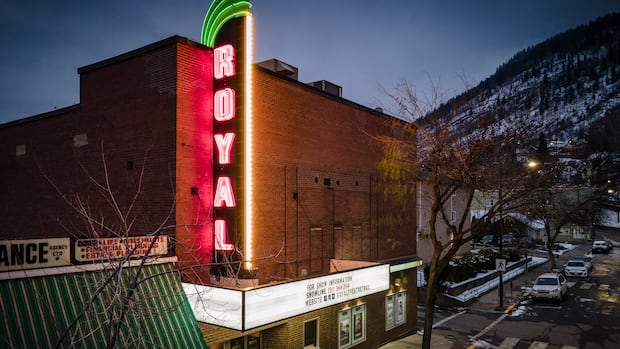When Shaun Aquiline saw Michael Mann’s Heat at his local cinema as a teenager in 1995, he was spellbound. “Going to the movies was the most important thing to me. It was magic.”Decades later, in 2022, Aquiline and his wife, Kirstin, acquired the Gem Theatre in Grand Forks, B.C., a 185-seat theatre built in 1913. They learned the ins and outs of the movie business: making popcorn, swapping letters on the cinema’s street-facing marquee and how to book films.The couple is among a new crop of exhibitors operating independent cinemas in smaller markets throughout the country. In many cases, these theatres are the cultural pulses of their communities, but they’re being squeezed from all sides — by streaming, studios, policy and economics.Even in the big cities, the landscape is shifting. In Vancouver, the historic Park Theatre was rescued this month by the Rio Theatre, backed by an investor group that includes filmmakers Sean Baker and Osgood Perkins, as well as actor Finn Wolfhard. The takeover followed Cineplex’s decision to give up the lease — a move that mirrors what’s happening across the country as major chains pull back and independent ownership returns.In 2022, Shaun and Kirstin Aquiline bought the Gem Theatre in Grand Forks, B.C., a 185-seat cinema built in 1913. (Gem Theatre)It’s part of a broader movement Sonya William has been tracking closely. As executive director of the Network of Independent Canadian Exhibitors (NICE), William says small town theatres represent some of the most important cinemas in the country. A study released by NICE in 2024 shows that 36 per cent of its membership identify as the only arts and culture venue in their region. “They’re keeping these communities dynamic and connected to the world in a very important way,” says William. The theatres contribute culturally, offering relevant, curated programming — but they contribute economically, too. “A whole family has tickets for a matinee, but stops for lunch at a diner down the street before the show, or people head to a pub for a beer after the movie. It has a ripple effect.”But William argues that the survival of these theatres is threatened by outdated terms enforced by big Hollywood studios. These inflexible requirements, where a new film must run for several weeks, prohibit cinemas from presenting more creative, community-minded programming.Shaun Aquiline says major studios effectively control how small theatres operate. When he booked a live comedy act during a blockbuster’s contracted four-week run, the distributor threatened to revoke future screenings unless the comedy show was cancelled. The deal required a prime slot to show their film, with 64 per cent of ticket sales going to the studio. “It shows how little freedom independent theatres actually have,” he says.While multi-week runs make sense for multiplexes, where a blockbuster like A Minecraft Movie can move from the biggest to the smallest screen as weekly box-office sales dwindle, smaller, single-screen cinemas don’t have that luxury. “With 4,000 residents — many of them children or seniors — there’s only a small core of moviegoers,” says Aquiline, adding that the local economy depends on the lumber mill, and with mill closures caused by tariffs, the loss of jobs has a ripple effect. “When money is tight, the first thing that goes is entertainment,” he says. “The studios could be the biggest ambassadors for micro-market theatres like ours. They could easily get good credit by simply saying: ‘We let them work with our products to do whatever they need to survive.’ And it wouldn’t make a difference to their bottom line.”Lisa Milne, owner of the Royal Theatre in Trail, B.C., says small town cinemas like hers matter because they give people a place to gather. (Royal Theatre)One hundred kilometres west, at the Royal Theatre in Trail, B.C., owner Lisa Milne says outdated provincial regulations are making it harder for small cinemas to survive. She points to two key issues: archaic film classification policies overseen by Consumer Protection BC that stipulate all films must be classified — even amateur snowboarding videos shot by children for fundraising events; and liquor licensing laws that restrict those under 19 from attending the cinema. “Children are a large part of our audience,” says Milne. As a result, B.C.’s current liquor laws offer no benefit to small town cinemas, cutting off a major source of potential revenue. Milne points to a contradiction: “Last year, we showed the Taylor Swift Eras Tour concert film, and we couldn’t serve drinks. But if you attended one of Swift’s sold-out shows at the stadium, you could drink a beer. Make it make sense.”Every revenue stream matters, says Milne. The NICE report states that 60 per cent of independent film exhibitors operated at a loss in the previous fiscal year. Milne purchased the Royal in 2009, just as cinemas were converting to digital projection. The theatre first opened in 1927, and converted from silent to talking pictures within a few years. “It is very much my community’s cinema,” she says. “They have fully embraced everything that me and my team have done, what we’re playing on the screen and the events we offer.” When the Royal recently played Downton Abbey: The Grand Finale, Milne invited knitting groups to one of the screenings. “We kept the lights low, and it was amazing.” Milne says small town cinemas like hers matter because they give people a place to gather. At the Royal, audiences don’t just watch a film; they run into neighbours, chat in the lobby and share an experience that reminds them they’re part of a community.Brian Allen, president of Premier Theatres, operates several drive-in theatres in Ontario, as well as the Capitol Theatre in Yellowknife. He says that owning the theatre property outright is key. “The industry hasn’t really recovered from the pandemic, so if you’re paying rent on a property, you’re cooked,” he says. The Allen family’s roots in the industry go back to the first decade of movie-going. His great uncles, Jule and Jay J. Allen, founded North America’s first national cinema chain. It began with a storefront theatre in Brantford, Ont., in 1906, at a time when silent films were projected as novelties, before slowly gaining a mass audience. By 1920, they had acquired and built over fifty theatres across Canada, dubbed “temples of silent art.”Allen’s Danforth Theatre (later renamed Century Theatre) was built in Toronto by Jay and Jule Allen in 1919. Today, the building is home to the Danforth Music Hall. (Archives of Ontario)By 1923, the Allen chain had fallen on hard times, forced to sell their assets to N.L. Nathanson’s Famous Players Canadian Corporation. Famous Players was acquired by Cineplex (then known as Cineplex Galaxy Income Fund) in 2005.But the Allen family bounced back, forming Premier Theatres in 1928. While Allen’s family has weathered every shift in the business, other communities have found ways to reinvent the local movie house. Cineplex and Landmark, the country’s two largest exhibitors (which control 85 per cent of the box office market share, according to the industry reporting system Comscore), have shuttered several locations across the country since the start of the pandemic. For Cineplex, locations in Brockville, Ont.; Windsor, Ont.; Amherst, N.S.; Bridgewater, N.S.; and most recently, Vancouver have all closed. For Landmark, operations have ceased in Campbell River, B.C.; Kitchener, Ont.; and Port Alberni, B.C. While movie-goers mourn the loss of their local movie theatre, their closures have provided opportunities for independent cinema. In Port Alberni, the former Landmark was purchased by a private ownership group. Renamed the Savoy Theatre, it re-opened on Oct. 1 and is now operated by the Canadian Mental Health Association. The Landmark staff retained employment, and revenues support mental health initiatives in the community. Sue McGiveron is the manager of operations at the Savoy. “It’s been interesting to see the engagement from the community on our Facebook page, who are asking to see certain types of films,” she says. “We are trying them out to see what people will come out for.”The Amherst Theatre in Amherst, N.S., is the only place to see a movie between Moncton, N.B., and Truro, N.S. In 2022, Cineplex closed the three-screen cinema. Entrepreneur Mikhial Mansour, whose family business, Mansour Menswear, is located a few doors down from the cinema, didn’t want to live in a city without a movie theatre. The Amherst Theatre in Amherst, N.S., is the only place to see a movie between Moncton, N.B., and Truro, N.S. (Amherst Theatre)“I loved going there as a kid,” says Mansour, who fondly recalls sitting in the front row of a packed screening of the first Harry Potter film. Mansour bought the building to ensure it keeps flickering as a cinema, and leaves its operation to his staff, who bring in the big movies but also rent out the cinema for birthday parties and community groups. The Sackville Film Society has called the theatre home since the closure of Vogue Cinema in Sackville, N.B., in 2023. Society president Thaddeus Holownia says his audience has adapted to the venue change. “We show movies that would generally not screen in this region, but that people want to see.” This fall, they’ve presented art-house successes like Misericordia, Materialists and Secret Mall Apartment. Paul Moore, a sociologist at Toronto Metropolitan University, explains that the pattern of big chains abandoning theatres isn’t new; it first happened in the 1960s, when television eroded attendance and Famous Players shut down several urban and rural cinemas. In Toronto, Moore says those closures left empty venues in immigrant neighbourhoods, which soon became diasporic film spaces — Greek, Italian and later Chinese-language theatres. Many of those locations evolved into second-run and repertory houses, forming the foundation of Canada’s art-house culture.“Just because [the chains] gave up the profit, neighbourhood movie houses didn’t give up,” adds Moore.The cycle is repeating itself: as major chains retreat, the same kinds of spaces — small, adaptable, locally owned — are once again giving audiences a reason to gather.Brian Allen, whose family has a long legacy as Canadian film exhibitors, books movies for the Roxy in Uxbridge, Ont. (Eric Veillette)Growing up in the family business, Allen relished his Thursday night visits to the Premier offices in the early 1970s, when he’d get to see an upcoming theatrical release in the corporate screening room. “We never had any idea what the film was going to be, which made it a lot of fun.”The film that made the biggest impression on him was The Last Picture Show, Peter Bogdanovich’s 1971 film about a cinema closing in a desolate Texas town. “It wasn’t until years later that I realized the weight of that: Your town is losing its movie theatre — it’s heavy,” Allen says. “But it doesn’t have to be that way. I’m happy to see people leading the charge.”
How small town cinemas across B.C. are being saved











